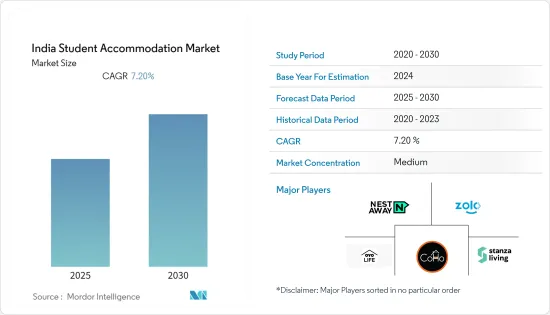PUBLISHER: Mordor Intelligence | PRODUCT CODE: 1645026

PUBLISHER: Mordor Intelligence | PRODUCT CODE: 1645026
India Student Accommodation - Market Share Analysis, Industry Trends & Statistics, Growth Forecasts (2025 - 2030)
The India Student Accommodation Market is expected to register a CAGR of 7.2% during the forecast period.

In the aftermath of the COVID-19 pandemic, there were a number of positive developments in the market, such as the lifting of restrictions on flights and travel, the removal of quarantine measures, restaurant re-opening, the introduction of indoor and outdoor activities, and the re-establishment of the overall halt, resulting in a post-COVID-19 boom. Student housing rentals have seen a steady increase in the post-pandemic period, with an annual growth rate of 10-15%. This confirms the increasing demand for student housing. Furthermore, the number of students enrolled in higher education is expected to rise to 92 million in 2036, providing investors and developers with an opportunity to capitalize on the sector's untapped potential and immense growth potential. It is expected that new players and potential international investors will enter the market.
The Indian education sector has experienced rapid growth in recent years, increasing student numbers and policy shifts. As a result, the need for an adequate amount of high-quality accommodation is on the rise. The changing microeconomic landscape, the ongoing transformation of the Indian educational sector, and a demand-driven, accommodation-centric gap between supply and demand have caused investors to shift their focus away from traditional real estate assets and towards alternative asset classes. Student housing in India is one such asset class. The concept of independent student accommodation is still relatively new in India; however, its advantages in terms of cost, convenience, in-room amenities, and nearness to educational institutions have led to its emergence as a distinct sub-category in the Indian property market. Furthermore, professionally managed student accommodation not only provides a sense of security and safety but also encourages social interaction among students.
India has been witnessing a steady rise in the number of international and domestic students, which has led to an increase in the demand for residential student accommodation. Cities with well-known universities have been particularly receptive to this trend. The student accommodation options available in the region range from traditional dormitory accommodation, purpose-built Student Housing (PBSA), and private apartments to homestays and more. PBSA is becoming increasingly popular due to its convenient amenities and services designed specifically for students.
India Student Accommodation Market Trends
Urbanization Helping to Grow the Market
The rapid growth of cities has necessitated the establishment of higher education institutions, such as universities and colleges, in urban areas. As a result, the demand for student accommodation in urban areas has increased significantly. Students are seeking accommodations that provide a superior standard of living, including modern amenities, safety, and amenities such as gymnasiums, communal areas, and study lounges. The prospect of steady rental income and a high occupancy rate has enticed considerable investment into the student accommodation industry by institutional investors and property developers.
Higher Education Enrolment Booming the Market
Currently, there are more than 40,000 international students enrolled in Indian colleges from 164 countries. Furthermore, the government launched a "Study in India" campaign in 2018 to provide premium education services to international students at competitive prices. This campaign is expected to attract approximately 2,000,000 students in India by 2026. The influx of students into the higher education sector has had a significant impact on the student accommodation market. This is true both domestically and internationally. In the case of international education, the majority of students travel for their studies, which has led to a significant increase in the demand for Purpose Built Student Accommodation (PBSA). PBSA and other housing solutions are available in close proximity to universities and colleges. As tuition fees increase, students are increasingly willing to split the cost of accommodation by living in Group Housing or PBSA.
India Student Accommodation Industry Overview
The report covers major players operating in the Indian student accommodation market. In terms of market share, Currently, there are several operators in the sector, all of which are expanding their presence in India. However, with a rising influx of students and a growing education sector, mid-size to smaller companies are increasing their market presence by securing new contracts and tapping into tie-ups with universities. Some major players are OYO Life, NestAway, Zolo Stays, Stanza Living, CoHo, etc.
Additional Benefits:
- The market estimate (ME) sheet in Excel format
- 3 months of analyst support
TABLE OF CONTENTS
1 INTRODUCTION
- 1.1 Study Assumptions and Market Definition
- 1.2 Scope of the study
2 RESEARCH METHODOLOGY
3 EXECUTIVE SUMMARY
4 MARKET INSIGHTS AND DYNAMICS
- 4.1 Market Overview
- 4.2 Market Drivers
- 4.2.1 Growth of Education Sector
- 4.2.2 Rising Demand for Quality Accomodation
- 4.3 Market Restraints
- 4.3.1 Enrolment Fluctuations
- 4.4 Industry Attractiveness - Porter's Five Forces Analysis
- 4.4.1 Bargaining Power of Suppliers
- 4.4.2 Bargaining Power of Buyers
- 4.4.3 Threat of New Entrants
- 4.4.4 Threat of Substitutes
- 4.4.5 Intensity of Competitive Rivalry
- 4.5 Insights on Current Trends and Innovations in the Market
- 4.6 Impact of COVID-19 on the Market
5 MARKET SEGMENTATION
- 5.1 By Service Type
- 5.1.1 Wi-Fi
- 5.1.2 Laundry
- 5.1.3 Utilities
- 5.1.4 Dishwasher
- 5.1.5 Parking
- 5.2 By Type
- 5.2.1 PG
- 5.2.2 PBSA
- 5.2.3 Studio Apartment
- 5.2.4 Live in On-Campus Housing
- 5.2.5 Live in Off-Campus Housing
6 COMPETITIVE LANDSCAPE
- 6.1 Market Concentration Overview
- 6.2 Company Profiles
- 6.2.1 OYO Life
- 6.2.2 NestAway
- 6.2.3 Zolo Stays
- 6.2.4 Stanza Living
- 6.2.5 CoHo
- 6.2.6 Placio
- 6.2.7 Your-Space
- 6.2.8 StayAbode
- 6.2.9 Weroom*
7 MARKET OPPORTUNITIES AND FUTURE TRENDS
8 DISCLAIMER AND ABOUT US




